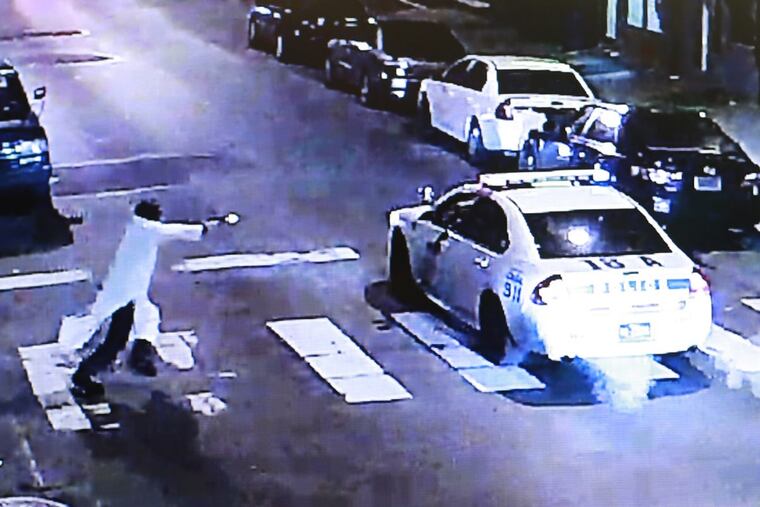Gunman who pledged ISIS allegiance convicted in 2016 shooting of Philly cop
The Delaware County man accused of shooting a Philadelphia Police officer two years ago in an ISIS-inspired ambush attack was convicted by a city jury Thursday on all counts - all but ensuring he will spend the rest of his life in prison.

After less than three hours of deliberations, a city jury Thursday convicted the Delaware County man accused of firing 13 shots at a Philadelphia police officer two years ago in an ISIS-inspired ambush attack.
The jury of nine women and three men found Edward Archer, 32, guilty of attempted murder, aggravated assault, and related crimes for shooting Police Officer Jesse Hartnett in West Philadelphia in January 2016, an incident that shocked the city and drew international attention for its purported terrorism link.
Archer, who showed little emotion during the two-week trial, stared straight ahead as the verdict was read. Hartnett, meanwhile, who offered emotional testimony earlier this week about surviving the assault, sat in the front row of the gallery and hugged his family and supporters after jurors announced their decision.
The 36-year-old officer suffered severe arm damage as a result of the shooting and has undergone 11 surgeries, including a rare procedure to insert metal plates into his elbow.
Speaking outside the Criminal Justice Center after the verdict, Hartnett said he still has physical limitations but remains hopeful he can overcome them and return to street duty. Even after facing a gunman who unloaded 13 shots at him from point-blank range, Hartnett said, he yearns to don his blue uniform again.
"This is the profession I chose," Hartnett said. "This is the profession I love."
Prosecutors Jan McDermott and Allison Borgatti presented a damning collection of evidence against Archer: surveillance video of the assault, ballistics and DNA tests linking Archer to the shooting, testimony from Hartnett's colleagues who responded to the scene, and a videotaped interrogation of Archer hours after the crime.
They wheeled in the still-damaged door of Hartnett's patrol car, and presented dummies dressed in clothes that mimicked what Archer and Hartnett wore at the time of the attack.
Borgatti argued in her closing statement that the evidence was "overwhelming."
Archer, she told the jury, "was armed and ready for war. He intended to kill that night."
During his interrogation with a police detective hours after the shooting, Archer repeatedly pledged his allegiance to the Islamic State and said he had acted out of religious inspiration — an admission that drew international headlines and was referenced by Republican presidential candidates in 2016.
Authorities later said there was no evidence indicating that Archer had coordinated the attack with any terrorist organization, and he was never charged with terrorism-related counts. Little else was said in court during the trial to expand upon his potential motive, and Archer repeatedly refused to speak to his court-appointed attorneys, Trevan Borum and Michael Coard, to form a defense strategy.
Borum last year unsuccessfully sought to have Archer ruled incompetent for trial. Archer's mother said after the shooting that her son had been hearing voices and acting strangely.
But Philadelphia Common Pleas Court Judge Leon W. Tucker ruled that Archer — who declined to submit to mental-health evaluations while awaiting trial — was aware of his situation and simply refused to cooperate.
After the trial, Borum said that he still believed Archer was mentally ill but that his client's lack of interest in participating in the case made it impossible to mount such a defense.
Archer had refused to answer basic questions from Tucker or his court staff during the trial, and he often stared or rubbed his head as evidence was being presented. He did not testify.
He acknowledged family members on his way out of the courtroom Thursday but did not say anything to them. Family members declined to comment as they left the courthouse.
Coard said he was satisfied that Archer had received a fair trial, and acknowledged that the evidence against his client was substantial.
The defense lawyer had praised Hartnett during his closing argument, calling him an "American hero," and saying: "The more I hear from that officer, the more I hear about that officer, the more impressed I am."
Since the attack, Hartnett has gotten married and had a daughter. Referring to the Hartnetts and the months prosecutors spent preparing for the trial, McDermott said: "If there was ever a case that deserved all the extras, this was the case."
Archer will be sentenced in May and faces decades in prison.